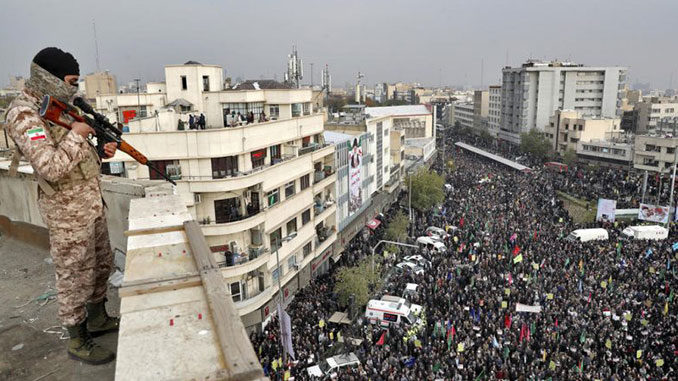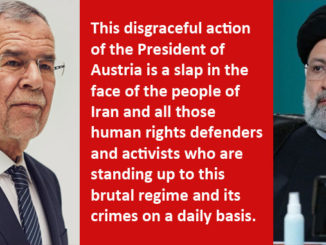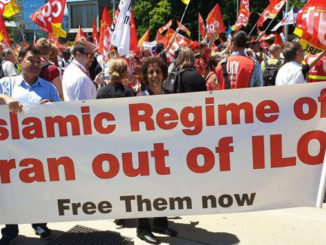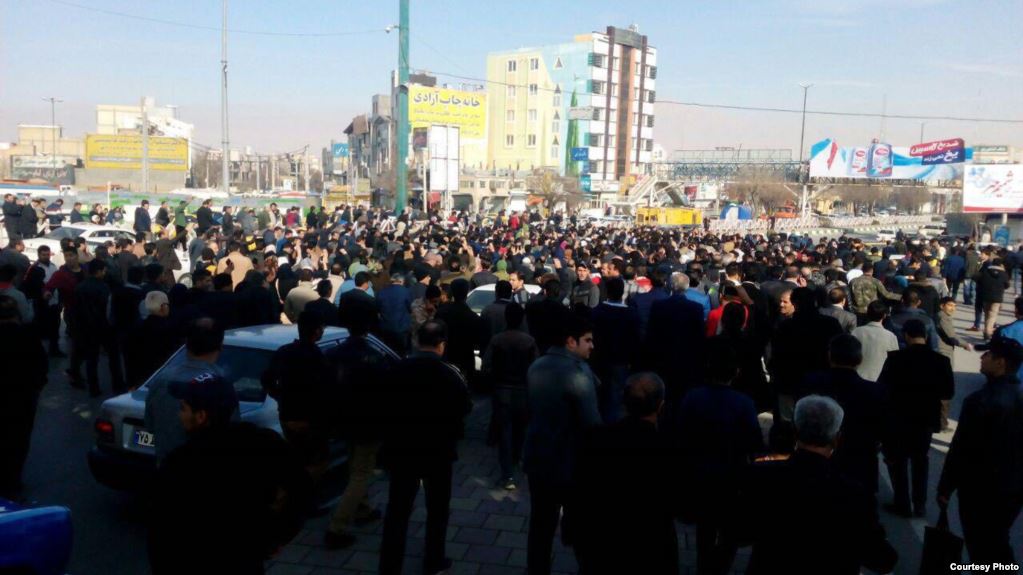
Silence about the brutality of the Islamic regime of Iran is not forgivable
In recent months and weeks, the Islamic regime of Iran has intensified its criminal and repressive actions against workers, pensioners, teachers and various sections of the society. Mass arrests and trumped up charges, withdrawal of medicines of political prisoners, torture and forced confessions, assassination, kidnapping, shooting of protesters, the destruction of houses of Baha’i citizens, finger amputations and the use of blinding as a punishment, execution, flogging, shooting of the “koolbars” – unemployed workers who carry goods on their backs to sell and earn a poor living – these are some of the many examples of the inhuman and medieval policies of the Islamic regime of Iran that have been unleashed more widely in recent months.
This regime is a disgrace to human society. The expectation of the people of Iran is that other governments and all international organisations should put pressure on this barbaric regime and not close their eyes to the constant violation of the most basic human rights of the citizens of this country by its rulers. In our opinion, silence in the face of these crimes is unforgivable.
The scope of repression and the crimes of the Islamic regime is such that Amnesty International in its new research briefing on 3 August alerted the international community to the Islamic regime’s conduct towards the popular protests in May this year, writing: “The international community must hold the Iranian authorities to account for the torrent of violence which their security forces unleashed on protesters in the south-west of Iran in May 2022 with complete impunity”.
Undoubtedly, governments, the UN and international institutions are aware of these atrocities. Our question is: Does the international community accept its own responsibility towards the trampling of life and human rights in this country? How long do they want to be silent and complacent in face of such violence and such crimes? From our point of view and that of the people of Iran, this regime should be isolated and boycotted worldwide. Its embassies should be closed down and its representatives should be expelled from the United Nations and organisations such as the ILO. This is the minimum expectation that the people of Iran have of any government that claims to defend human rights.
Some examples of the Islamic regime’s atrocities just in recent months are appended to this letter. The people of Iran will not accept the silence of governments and a policy of appeasement towards the criminal Islamic regime under any excuses or expediencies.
Worker-communist Party of Iran – International Office
4 August 2022
***
Appendix
Outlined below are a few examples of the atrocities of the Islamic regime of Iran in recent months, any one of which is enough to prosecute the heads of any government for crimes against humanity:
– Following the recent attacks on women by the Iranian’s government’s so-called “hijab and chastity” patrols, Sepideh Rashnoo, a 28-year-old Iranian woman artist and writer, was arrested for opposing the compulsory hijab and was forced to confess on television. Sepideh was arrested for removing her hijab on the bus and speaking against hijab. She was first transferred to one of the IRGC detention centres (the regime’s paramilitary force and institution), and a case was fabricated against her. Her protest, like countless other protests, was attributed to “foreign governments” and after 14 days of silence, the news channels of the Islamic Republic broadcast the video of her forced confession. Torturing prisoners to extract confessions is a common method used by the Iranian regime in order to sentence them to prison or even death. Sepideh’s current place of detention is unknown, and she has been denied access to her family or the right to have a lawyer. By sending its hordes of so-called “hijab and chastity” patrols onto the streets, the Islamic Republic has launched a massive attack against women and the entire society. Against this assault, women have stood up with the campaign “To hell with your hijab”, and taken off their hijab in defiance. The regime has violently attacked the protesters and many have been arrested.
– On 2 August, around 200 government officers surrounded the village of Roshankoh in Sari and destroyed the houses of Baha’i citizens. In this attack, the houses of at least 6 Baha’i citizens, namely Keyhan Ghanbari, Sasan Alavi, Omid Ghanbari, Ghavameddin Sabetiyan, Hadi Chalengari and Arman Gholinjad, were completely destroyed. Persecuting, depriving of social and economic status and killing members of the Baha’i community (a religious community which the Islamic regime proscribes) has been a policy of the Islamic Republic right from its inception.
– A policy of the regime of Iran is terrorism against political activists abroad. A recent example is the attempt to assassinate journalist and political activist Masih Alinejad. According to reports, an armed man named Khalid Mehdiyev, who had been lurking around Masih Alinejad’s home for several days, was arrested by New York police on 28 July. The suspect is believed to have intended to assassinate Masih Alinejad at the behest of the Islamic Republic. This is the second terrorist plot by the Iranian regime against Masih Alinejad (the other being the attempt by four Islamic Republic spies in July last year to kidnap her from the US and smuggle her via Venezuela to Iran), which fortunately failed both times.
– Against the skyrocketing inflation in Iran, massive protests were staged in May in various cities in Iran, such as in Izeh, Dezful, Andimshek, Borujerd, Dorood, Joneghan, Farsan, Dehdasht and many other cities. The regime countered these protests with brutal violence, and according to official sources, at least four people were killed and many were arrested. The regime’s security forces used shotguns against protesters, injuring many, including bystanders and children. These atrocities are documented in a new research briefing published by Amnesty International on 3 August titled They are shooting brazenly: Iran’s militarized response to May 2022 protests.
– A recent shocking crime of the Islamic government is cutting off the fingers of two prisoners with a guillotine for theft. The first case was carried out on a 40-year-old man named Pooya Torabi on 27 July. The barbaric act was carried out in the presence of a number of officials and a medical doctor in Evin prison, following which Mr Torabi was transferred to a hospital outside the prison as an emergency. Also, on 31 May, four fingers of a man named Seyyed Barat Hosseini were cut off with a guillotine without the use of anaesthetic. Hosseini is still being kept in Evin prison, and despite suffering from an infection and psychological trauma, has been denied access to medical and mental health care. Eight other prisoners in Iran are currently at risk of having their fingers amputated. Amputation is an Islamic punishment in the laws governing Iran.
– According to government news, the sentences of blinding on three people in Iran have been referred for execution to the criminal court of Tehran. These verdicts are related to three separate cases of a woman and two men who were sentenced to retribution (qesas) by blinding. Retribution is another barbaric Islamic penal law in Iran.
– Families whose loved ones have been killed and are seeking justice have also been targets of persecution by the regime in Iran. These include families who lost their loved ones in the horrific 1988 massacre of political prisoners and the mass executions of political activists and dissidents in the 1980s. Most of the detained families have now been freed as a result of popular campaigns and protests, but Nahid Shirpisheh, the mother of Pooya Bakhtiari, one of the victims of the November 2019 massacre, is still in prison.
– The daily killing of “koolbars” in the west of the country and fuel bearers in the east of the country is one of the other atrocities committed by the Islamic Republic. 30-year-old Keyvan Abdullah was killed on 31 May by direct fire from Iranian border guards. Koolbars are unemployed workers who make a living in this way because they have no other income. Over the years, hundreds of koolbar workers and fuel bearers have been killed by the Islamic regime.
– According to the Supreme Leader Khamenei’s fatwa (Islamic order), security forces can “fire at will”. On the evening of 30 June the security forces shot at the car of Rahman Rashedi Manesh from the village of “Qolqoleh”, a suburb of Marivan. Two children of the Rashedi Manesh family, namely Mehdi and Matin, 9 and 13, respectively, were killed in the attack. The father, Rahman, and mother, Homa, survived, but were arrested.
– Just in the past two months, over 240 teachers across Iran have been arrested and imprisoned for protesting against their poor living conditions and the state of the education system, and demanding improved pay and free education for children.
– In May two French nationals and labour activists, namely Cecile Kohler and Jacques Paris, who were visiting Iran, were arrested along with a number of teachers, labour and social activists, and detained on the absurd charge of espionage and collaboration with foreign states. Fabricating charges against activists is a longstanding ploy of the regime in Iran in confronting social and workers’ protests. However, by arresting and jailing citizens of other countries or dual Iranian-foreign nationals, the regime also seeks to use them as bargaining chips in its policy of blackmail and to swap innocent hostages for its convicted terrorists abroad. The detainees in this case, whose “crime” is meeting with these two French trade unionists, are: teachers Rasoul Bodaghi, Shaban Mohammadi, Eskandar Lotfi and Masoud Nikkhah; workers Valeh Zamani, Hassan Saeedi, Reza Shahabi; social activists Anisha Assadollahi, Keyvan Mohtadi and Reyhaneh Ansari Nejad. A number of other foreign nationals and dual citizens who are currently in prison in Iran include: Iranian-German Jamshid Sharmahd, who was kidnapped two years ago in Dubai and smuggled into Iran and who is now in imminent danger of execution; Iranian-Swedish Ahmad Reza Djalali, who is also under a sentence of death; Belgian citizen Olivier Vandecasteele; Iranian-German citizen Nahid Taghavi; Iranian-British citizen Mehran Raoof; Iranian-American citizen Morad Tahbaz, who is also a British citizen; and many others.
– Among those arrested, Valeh Zamani’s situation is particularly of cause for concern, and he is at the risk of death. Valeh Zamani has Hepatitis C and should be receiving treatment. However, he has been tortured, coerced and denied access to his medicines. After the interrogation, due to the contagious nature of his illness, he was returned to solitary confinement and is only being given painkillers.
– To these recent cases must of course be added the killing of 1,500 people in the mass protests against the fuel price rise in November 2019, the execution of thousands of dissidents in the 1980s, the execution of champion wrestler Navid Afkari, arrested for participating in popular protests in 2018, the shooting down of Ukrainian passenger plane Flight 752, killing all 176 people onboard, the death sentences against LGBTs, and many other atrocities committed by this regime.
—
https://wpiran.org/english/ international.office@wpiran.org




Be the first to comment